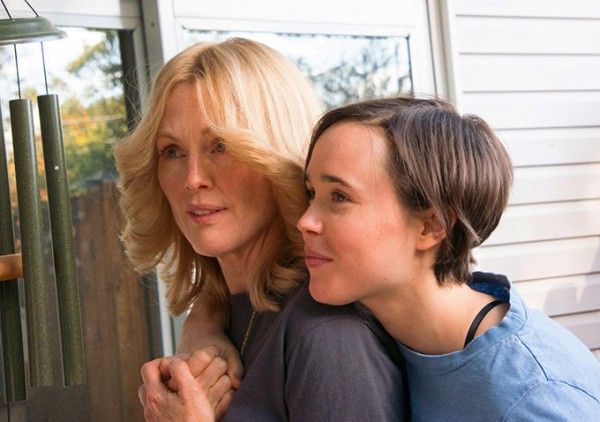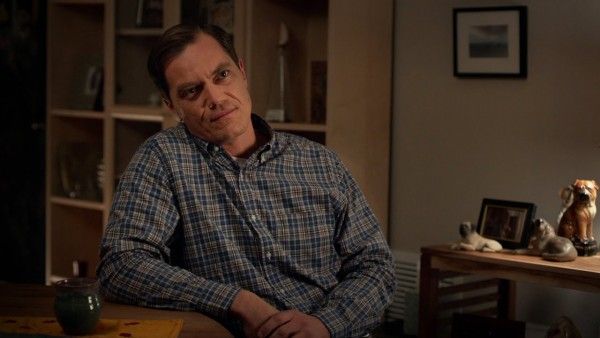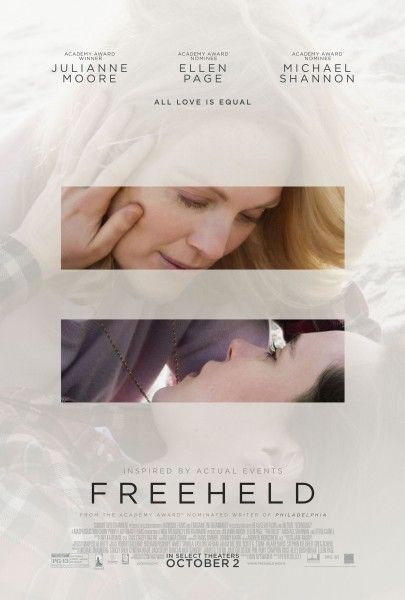In the real world, 2015 has been a landmark year for gay rights. Gay marriage finally became legal nationwide this summer, and it was thanks in part to the hard work and suffering of couples like Laurel Hester and Stacie Andree. However, you wouldn’t know the details of that work going solely by Peter Sollett’s film Freeheld, which co-opts Hester and Andree’s story and twists it into a pat little tale that pushes them to the background and focuses on her heterosexual friend fighting the good fight. Hester and Andree’s case may not be as pivotal as Stonewall, but Sollett’s film is no less offensive in how it marginalizes its central gay figures, a crime made even more unforgivable given the strong chemistry between leads Julianne Moore and Ellen Page.
In the late 2000s, Laurel Hester (Moore), a detective working in Ocean County, New Jersey, fell in love with mechanic Stacie Andree (Page), but Hester kept their relationship as private as possible in fear that being openly gay would prevent promotion. However, she and Andree eventually made it official, or at least as official as they could make it at the time by becoming domestic partners. When Hester was diagnosed with stage-four lung cancer, she wanted her pension to go to Andree so she could keep their house. Ocean County’s conservative board of Freeholders ruled against Hester’s request, and claimed that benefits could only be bequeathed to spouses. This ignited a court battle that brought in activist Steven Goldstein (Steve Carell) and Hester’s work-partner, Dane Wells (Michael Shannon), who tried to rally his fellow cops to Hester’s cause.
The first half of Freeheld does a nice job painting a portrait of Hester and Andree’s life, and it’s a shame that Sollett doesn’t spend more time on watching the complexities of a couple where one wants to remain closeted and the other doesn’t. Because gay marriage is now legal, Freeheld can’t be an advocacy picture, but discrimination still exists, and watching the couple deal with it would have added some nice texture to their relationship beyond the strong chemistry Moore and Page bring to their performances. We can see how hurt Stacie is every time Laurel lies to others and says that Stacie is her sister or her roommate rather than her girlfriend. It would also hammer home that at the time, it would have been legally impossible for Stacie to be Laurel’s “wife”. The most they could ever be in the eyes of the law were “partners”.
Unfortunately, the second half shows that Sollett really has no interest in Hester and Andree as anything more than props in a legal battle. While Hester’s fight for equality is the “hook” of her story, Freeheld pushes her and Andree to the background and turns the focus on Goldstein and Wells. While the reality may have been that these two men took point while Andree cared for her dying partner, this isn’t the 2007 documentary short film of the same name. There’s room for dramatic license and to make Andree a more active character.
Instead, it goes into the hands of two guys. Goldstein is gay, but it’s a stereotypical portrayal, and while it may have been meant to convey a “colorful” persona, it instead comes off as cartoonish and borderline offensive. When I look at the work and restraint Steve Carell put into playing the murderous John DuPont in Foxcatcher, I’m shocked by his estimation of Goldstein, which seemed to be “He’s gay and Jewish, so I’ll be flaming and wear a yarmulke.” And even as the gay character working to affect positive change, the movie questions his activism and makes sure that the straight, unimpeachable Wells chastises Goldstein’s tactics.
The movie’s “hero” is Wells, the straight guy who can be trusted to stand up for the rights of minorities, and knows how the game is played. Shannon gives a commanding performance because that’s what he does, but the character has no arc. He’s never against equality; Hester just believes he will be, and the film responds, “Hey, us straight guys are more understanding than you give us credit for!” He later rallies the department to give Hester their sick days because he’s such a swell guy.
Sollett loses sight of the fact that his hero is Hester, who starts out closeted and eventually has to come out so that the person she loves won’t lose their home. While it’s good to know that no gay couple in the U.S. will have to face what Laurel Hester and Stacie Andree had to go through, it’s wrong that their struggle should be reframed to make them background characters in a cis-male hero narrative.
Rating: D-




